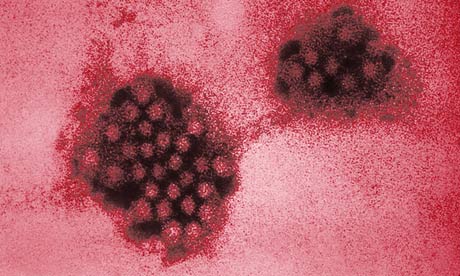
Norovirus, AKA the winter vomiting bug, is exactly what you don't want to get this Christmas, but this year it has really taken off. The Health Protection Agency (HPA) is warning people to do their best to avoid it and, if they get it, to take every precaution not to spread it.
How much of it is there about?
The HPA says 3,046 cases have been confirmed by lab tests so far this winter – but that is a fraction of the true number. It assumes there are 288 unreported cases, where people have slunk away to suffer alone at home (in fact, the best idea), for every confirmed case. So that is almost 900,000 people who have been made utterly miserable so far, albeit for only a few days.
Is this worse than usual?
Yes. It is 83% higher than last year, when 1,669 cases were reported (more than 480,000 had it, taking into account unreported cases). The numbers also started to rise earlier this year – but nobody knows why.
How do you know you've got it?
It's hard to miss. The symptoms are sudden vomiting and diarrhoea. "It is very unpleasant while you are unwell," says John Harris, an expert in norovirus at the HPA. Some people get a temperature, headache and stomach cramps.
How long does it last?
A day or two usually. If it goes on for three days or more, you should see a doctor. The main complication is dehydration, which is more dangerous in the very young and very old. Most people recover without any treatment.
Is it very catching?
Yes. This is the biggest problem. It is incredibly easily spread. It has a habit of hitting cruise ships – with all those passengers cooped up together for a week or two, it is hard for anyone to escape. Two P&O ships have had to be "deep-cleaned" after outbreaks this winter. More than 400 passengers were struck down on the Oriana during a Baltic cruise – which had also suffered an outbreak on its previous trip – and there were 10 confirmed cases on board the Azura after a trip to Iberia. Nursing homes and hospitals also have real problems when norovirus takes hold. There have been 61 hospital outbreaks in the fortnight up to 16 December – compared with 35 in the same timeframe last year. Wards have to be closed. Nursing staff go sick as well as patients.
Why is it so contagious?
The virus is easily passed around on the hands, on surfaces that contaminated hands have touched and food they have prepared. It is hard to get rid of and lingers for up to a week after the sick person has recovered. Even clothes and sheets can be infected for days afterwards and need washing at 60C or higher to kill the virus. Detergent and disinfectant alone will not do the trick.
How can I avoid it?
Persuade your family and friends to stay at home if they get it and observe strict hygiene measures. Wash your hands a lot.

